-
Government-developed standards not an effective cybersecurity approach: analyst
DHS said the department has “recently learned of a vulnerability that existed in the software used by a DHS vendor to process personnel security investigations.” analyst says that it is bad enough that hackers gained access to the personal information of thousands, but what is even more worrisome is the fact that DHS, with it spotty cyber security record, has been placed in charge of regulating the cybersecurity efforts of critical infrastructure industries.
-
-
Los Alamos director: cyber-securing U.S. electrical grid key to energy security
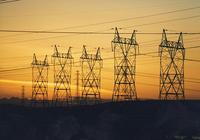
Los Alamos National Lab (LANL) director Charlie McMillan told a gathering of energy executives that securing the U.S. electrical grid is a major concern now, and it is only becoming more serious.
-
-
Hagel says Chinese cyberattacks a “growing threat”
Defense Secretary Chuck Hagel warned of a “growing threat” of cyberattacks against the United States, saying that America and its allies need to “establish international norms of responsible behavior in cyberspace.” Hagel spoke to an audience of defense analysts and defense ministers from Asia and Europe at the annual conference of the International Institute for Strategic Studies on Saturday.
-
-
Wildfires in west, southwest forcing hundreds from their homes
The arrival of summer has typically been accompanied by an increase in the number and intensity of wild fires in the U.S. southwest, and this year is no exception.
-
-
Lawmaker offers a way to finance U.S. infrastructure investment -- with no taxpayers’ money
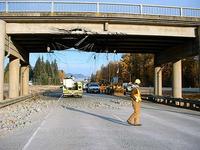
Representative John Delaney (D-Maryland) says has an answer to the nation’s infrastructure problems, and that it will not cost taxpayers a dime. The money will be raised through the sale of special bonds, not guaranteed by the government, to companies that earn profits outside the United States.
-
-
Mitigating fires in the wildland-urban interface
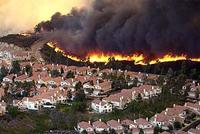
More than forty-six million residential structures in about 70,000 communities in the United States are located in the so-called wildland-urban interface (WUI). On average, WUI fires destroy 3,000 buildings annually. They accounted for six of the ten most costly fires in the United States over the last 100 years. Five of these fires occurred in California, where the incidence of wildfires currently is up 47 percent this year over last.
-
-
Chinese government hackers steal designs of advanced U.S. weapons systems
The Chinese government has been conducting a broad, sustained, and disciplined campaign of cyberattacks against U.S. government agencies, critical infrastructure, private companies, and news organizations. The public version of a study prepared for the Pentagon by the Defense Science Board now says that Chinese government hackers have also been able to penetrate the computer networks of all the major U.S. defense contractors, stealing the designs and specifications of the most advanced weapon system in the U.S. arsenal, and gaining insights into broad technologies on which U.S. military advances are based.
-
-
U.S. infrastructure drops in world infrastructure ranking
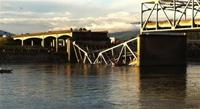
The U.S. infrastructure has slipped badly in the world’s infrastructure ranking, both in absolute and relative terms, according to the Global Competitiveness Report for 2012-13, published earlier this month by the World Economic Forum.
-
-
Report: U.S. companies should consider counter-hacking Chinese hackers
A group studying how the United States should respond to the sustained campaign of cyberattacks conducted by Chinese government hackers against U.S. companies, said the United States should seriously consider a campaign of retaliatory cyberattacks against the hackers.
-
-
U.S. to help protect private companies from malicious cyberattacks
The U.S. government said it will help protect private companies from cyber attacks. DHS secretary Janet Napolitano said a system is being developed which will monitor Internet traffic directed to critical infrastructure businesses and block attacks on software programs.
-
-
Senate passes water resources bill, funding flood control projects
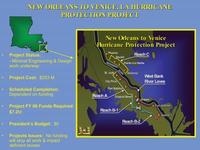
Several projects for the Army Corps of Engineers will now be expedited under a bi-partisan Senate legislation passed last Wednesday. The authors of the bill hope the legislation will move the Morganza-to-the-Gulf hurricane protection project forward. The project goal is to install a series of levees, locks, and other systems through the Terrebonne and Lafourche parishes, which will protect about 200,000 people from storm surges like the ones Hurricane Katrina caused.
-
-
Panel's draft bill shields DHS funds
A house panel introduced a bill last week that will protect DHS from budget cuts facing other domestic agencies under the house’s budget plan. This will allow the department to hire 1,600 new agents at Customs and Border Patrol agency, replace cuts to local and state governments, boost spending on cybersecurity, and abandon cuts to the Coast Guard.
-
-
Cybersecurity framework for critical infrastructure: analysis of initial comments
On 12 February 2013 President Obama issued the “Improving Critical Infrastructure Cybersecurity” executive order, which called for the National Institute of Standards and Technology (NIST) to work with industry to develop a voluntary framework to reduce cybersecurity risks to the nation’s critical infrastructure, which includes power, water, communication, and other critical systems.
-
-
GPS technology offers 3-minute tsunami alerts
Researchers show that by using global positioning systems (GPS) to measure ground deformation caused by a large underwater earthquake, they can provide accurate warning of the resulting tsunami in just a few minutes after the earthquake onset.
-
-
The contribution of geophysics to disaster planning
Earthquakes, tsunamis, and other natural disasters often showcase the worst in human suffering — especially when those disasters strike populations which live in rapidly growing communities in the developing world with poorly enforced or non-existent building codes. Geophysicists can help by identifying natural hazards, and by developing effective disaster risk reduction strategies which integrate many different experts.
-
- All
- Regional
- Water
- Biometrics
- Borders/Immig
- Business
- Cybersecurity
- Detection
- Disasters
- Government
- Infrastructure
- International
- Public health
- Public Safety
- Communication interoperabillity
- Emergency services
- Emergency medical services
- Fire
- First response
- IEDs
- Law Enforcement
- Law Enforcement Technology
- Military technology
- Nonlethal weapons
- Nuclear weapons
- Personal protection equipment
- Police
- Notification /alert systems
- Situational awareness
- Weapons systems
- Sci-Tech
- Sector Reports
- Surveillance
- Transportation
Advertising & Marketing: advertise@newswirepubs.com
Editorial: editor@newswirepubs.com
General: info@newswirepubs.com
2010-2011 © News Wire Publications, LLC News Wire Publications, LLC
220 Old Country Road | Suite 200 | Mineola | New York | 11501
Permissions and Policies
Editorial: editor@newswirepubs.com
General: info@newswirepubs.com
2010-2011 © News Wire Publications, LLC News Wire Publications, LLC
220 Old Country Road | Suite 200 | Mineola | New York | 11501
Permissions and Policies
